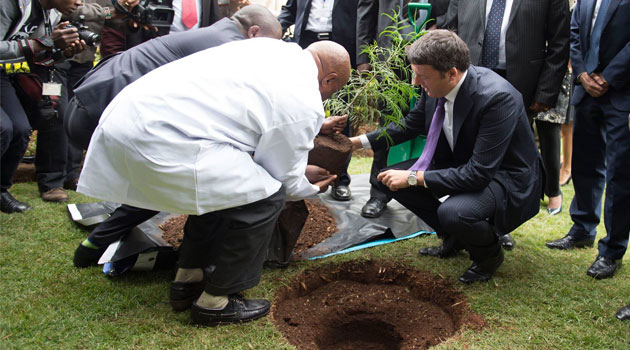NAIROBI, Kenya, July 15 – Turns out July visits to Kenya aren’t the only thing that US President Barack Obama and Italian Prime Minister Matteo Renzi have in common.
The two are not only the first US and European Heads of States, respectively, to visit Kenya (in this century at least), but both are apparently fans of the hit US television series, House of Cards.
“Don’t believe everything you watch. It’s not like Members of Parliament go around shoving journalists in front of trains,” he told University of Nairobi students in reference to the premiere episode of the show’s second season.
He was giving a public lecture at the university on the challenge extremism poses in light of the murder of 142 students by the Al Shabaab at the Garissa University College in April.
“It’s telling that they chose to hit a university because, like a museum, it’s a symbol of our cultural identity. It’s the future.”
And although Italy has “tangibly” showed its support by offering scholarships to 25 survivors of the attack and by entering into an agreement that would see Italy bolster the intelligence gathering capabilities of Kenya’s security forces; intelligence and equipment alone, he said, would not root out the extremist ideology that has led to the terror attacks witnessed in the recent past.
“Never before in history have world leaders had access to as much information – or technology for that matter – but it’s much more complex. As politicians we’re trained to simplify our message but you can’t reduce this to 140 characters.”
The key, he submitted, was to win over the minds of the youth.
“Don’t just be a follower like on Twitter, be a leader. That’s what Universities are for. They are a place to innovate, find solutions to our problems. That’s what Italy has been historically, a place where people can get the mental space to create. That’s why the attack on Garissa University College hit close to home.”
“I remember receiving the Italian Foreign Affairs Minister’s condolences the night of the attack,” Kenya’s Foreign Affairs Minister, Amina Mohamed, testified.
His government, Renzi said, therefore planned to increase its aid contributions to Africa. “But we need to stop viewing Africa simply as an aid recipient.”
“I remember when I was Mayor for Florence and I devised a system to pay bus fare through the mobile phone. I thought it was the greatest accomplishment until a journalist told me Kenyans can use M-PESA to pay for pretty much anything.”
His government’s contribution to Kenya, he said, would therefore focus on fostering innovation, renewable energy and rural development, “we’re known for being engineers and building bridges both literally and figuratively speaking.”
Africa’s prosperity and stability, he said, would in the long term negate the need for Africans to risk their lives on the Mediterranean in search for a better life in Europe and take the pressure off his country which serves as the, “bridge,” between Africa and Europe.
READ: Mediterranean migrant crossings to Europe ‘hit 150,000 in 2015’
“We value life and so if we can save them we will save them… but unfortunately I alone cannot change perceptions in Europe.”
But even given the challenges of extremism and instability in Africa, Renzi was optimistic of a, “brighter,” future for a continent that has historically been known as the dark continent.
“It’s hard for my children to imagine their forefathers fighting the French for anything but the Champions League. But look at us now after all the horror of World War II, we voluntarily formed a union.”
“When I watched Invictus with my children they found it hard to believe that a man would spend 27 years of his life in prison for an ideal. But then again that’s what Universities are for, to remind us to be brave and think big. And so while terrorists hit our universities in the hope that we will give up our cultural identities, we must be courageous in living out our values and believe in a better tomorrow.”










































